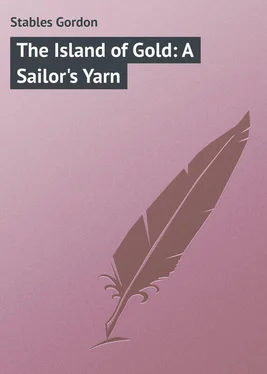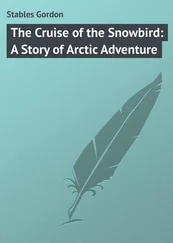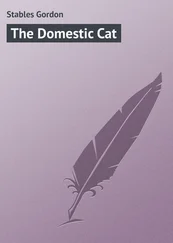Gordon Stables - The Island of Gold - A Sailor's Yarn
Здесь есть возможность читать онлайн «Gordon Stables - The Island of Gold - A Sailor's Yarn» — ознакомительный отрывок электронной книги совершенно бесплатно, а после прочтения отрывка купить полную версию. В некоторых случаях можно слушать аудио, скачать через торрент в формате fb2 и присутствует краткое содержание. Издательство: Иностранный паблик, Жанр: foreign_prose, Морские приключения, на английском языке. Описание произведения, (предисловие) а так же отзывы посетителей доступны на портале библиотеки ЛибКат.
- Название:The Island of Gold: A Sailor's Yarn
- Автор:
- Издательство:Иностранный паблик
- Жанр:
- Год:неизвестен
- ISBN:нет данных
- Рейтинг книги:4 / 5. Голосов: 1
-
Избранное:Добавить в избранное
- Отзывы:
-
Ваша оценка:
- 80
- 1
- 2
- 3
- 4
- 5
The Island of Gold: A Sailor's Yarn: краткое содержание, описание и аннотация
Предлагаем к чтению аннотацию, описание, краткое содержание или предисловие (зависит от того, что написал сам автор книги «The Island of Gold: A Sailor's Yarn»). Если вы не нашли необходимую информацию о книге — напишите в комментариях, мы постараемся отыскать её.
The Island of Gold: A Sailor's Yarn — читать онлайн ознакомительный отрывок
Ниже представлен текст книги, разбитый по страницам. Система сохранения места последней прочитанной страницы, позволяет с удобством читать онлайн бесплатно книгу «The Island of Gold: A Sailor's Yarn», без необходимости каждый раз заново искать на чём Вы остановились. Поставьте закладку, и сможете в любой момент перейти на страницу, на которой закончили чтение.
Интервал:
Закладка:
Ransey got tired of fishing at last, and made up his rod. There was some sort of silent joy or happiness away down at the bottom of the boy’s heart, and for a moment he couldn’t make out what was causing it. The big haul of fish he had caught? Oh, no; that was a common exploit. Having smashed the postman with a mushy turnip? That was capital, of course, but that wasn’t it. Ah! now he has remembered – father was coming home in four days. Hurrah! he must have some fun on the head of it. Ransey loved to have a good time.
But, duty first. Babs was a good little girl – or a “dood ’ittle dirl,” as she phrased it – but even good girls get hungry sometimes. Babs must be fed. She held her arms straight out towards him.
“Babs is detting tired,” she lisped.
So he took her up, kissed her, and made much of her for a minute, then set her against a tree where the moss was green and soft. With a bit of string and a burdock leaf he made her a beautiful bib; for though Ransey himself was scantily attired, the child was really prettily dressed.
And now the boy produced a pickle bottle from the luncheon bag, likewise a small horn spoon. The pickle bottle contained a pap of bread and milk; and with this he proceeded to feed Babs somewhat after the manner of cramming turkeys, until she shook her head at last, and declared she would never eat any more – “Never, never, never !”
There was a turnip-field not far off. Now Bob was as fond of raw turnips as his master. He knew where the field was, too.
“Off ye go for a turmut, Bob; and mind ye bring a big ’un. I’ll look after Babs till ye comes back.”
Bob wasn’t long gone. He had obeyed his master’s instructions to the very letter – in fact, he had pulled more than six turnips before he found one to please him. (It is easy to teach a dog this trick, only stupid farmer folks sometimes don’t see the fun of it. Farmer folks are obtuse. – G.S.) That “turmut” made Bob and Ransey an excellent luncheon, and Babs had a slice to amuse herself with.
The day was delightfully warm, and the wind soft and balmy. The sunshine filtered down through a great beech-tree, and wherever it fell the grass was a brighter green or the dead leaves a lighter brown. Now and then a May beetle would go droning past; there were flies of all sorts and sizes, from the gnats that danced in thousands over the bushes to the great rainbow-like dragonfly that darted hither and thither across the stream; grasshoppers green and brown that alighted on a leaf one moment, gave a click the next, and hurled themselves into space; a blackbird making wild melody not far off; the bold lilt of a chaffinch; the insolent mocking notes of a thrush; and the coo-cooing of wood-pigeons sounding mournfully from a thicket beyond the stream.
High up in that beech-tree myriads of bees were humming, though they could not be seen. No wonder that under such sweet drowsy influences Babs began to wink and wink, and blink and blink, till finally her wee head fell forward on her green-bough bib.
Babs was sound asleep.
Book One – Chapter Three.
“O Eedie, I’ve Found a Child.”
Ransey Tansey took his tiny sister tenderly up and spread her, as it were, on the soft moss.
“She’s in for a regular forenooner, Bob,” said the boy, “and I’m not sure I don’t like Babs just as well when she is asleep. Seems so innercent-like, you know.”
Bob looked as if he really did understand, and tried by means of his brown eyes and that fag-end of a tail to let his master know that he too liked Babs best asleep, because then no attempts were made to gouge his eyes out with pieces of stick, or to ram the business end of a tin whistle halfway down his throat.
“Bob!” said Ransey.
“Yes, master,” said Bob, raising his ears.
“Babs is a sailor’s darter, ye know.”
Bob assented.
“Well, she ought’er sleep in a hammock.”
“To be sure. I hadn’t thought of that,” said Bob.
“I can make one in a brace o’ shakes, and that’s sailor langwidge. Now just keep your eyes on me, Bob.”
Ransey Tansey was busy enough for the next five minutes. He took that shepherd-tartan shawl, and by means of some pieces of string, which he never went abroad without, soon fashioned it into a neat little hammock. Two saplings grew near, and by bending a branch downward from each, he slung that hammock so prettily that he was obliged to stand back for a little while to smile and admire it.
When he lifted Babs and put her in it, and fastened the two sides of the hammock across her chest with some more string and a horse-shoe nail, so that she could not fall out, the whole affair was complete.
“Hush-a-bye, baby, upon the tree-top,
When the wind blown the cradle will rock.”
Well, the wind did blow, but ever so softly, and the little hammock swayed gently to and fro. And the blackbird’s voice seemed to sound more melodiously now; the thrush went farther away; only the wild pigeons continued to coo, coo, and the bees to hum, high, high up in the green beech-tree.
No wonder that the baby slept.
“Come along now, Bob. We’ve a whole hour at least.”
The boy placed his rod and bag on the branches of a tree.
“A whole hour, Bob, to do as we likes. No good me askin’ that idiot of an Admiral to watch Babs. He’d only begin scray-scrayin’ and hopping around the hammock, and Babs would wake. I’m goin’ to run wild for a bit, are you?”
And off he bounded, with Bob at his heels.
The Admiral, whose feet were getting cold now, hopped out of the stream, stretched out his three-foot neck, and looked after them.
“They think they’re going to leave me behind, do they? Tok – tok – tok,” – which in craneish language means “No – no – no.”
So away he went next, with his head and his long neck about a yard in front of him, and his wings expanded. It would have puzzled any one to have told whether the Admiral was running or flying.
If Ransey Tansey climbed one tree he climbed a dozen. Ransey walked through the wood with upturned face, and whenever he saw a nest, whether it belonged to magpie, hawk, or hooded crow, skywards he went to have a look at it.
He liked to look at the eggs best, and sometimes he brought just one down in his mouth if four were left behind, because, he thought, one wouldn’t be missed. But even this was sinful; for although birds are not very good arithmeticians, every one of them can count as far as the number of its eggs – even a partridge or a wren can.
Sometimes the Admiral wanted to investigate the nests, but Ransey sternly forbade him. He might dance round the tree as much as he liked, but he must not fly up.
Bob used to bark at his master as he climbed up and up. Indeed, when perched on the very, very top of a tall larch-tree Ransey himself didn’t look much bigger than a rook.
Yet I think the ever-abiding sorrow with Bob was not that he had not a tail worth talking about, but that he could not climb a tree.
Different birds behaved in different ways when Ransey visited their nests. Thus: a linnet or a robin, flying from its sweet, cosy little home in a bush of orange-scented furze, would sit and sing at no great distance in a half-hysterical kind of way, as if it really didn’t know what it was about. A blackbird from a tall thorn-tree or baby spruce, would go scurrying off, and make the woods resound with her cries of “beet, beet, beet,” till other birds, crouching low on their nests, trembled with fear lest their turn might come next. A hooded crow would fly off some distance and perch on a tree, but say nothing: hooded crows are philosophers. A magpie went but a little distance away, and sat nodding and chickering in great distress. A hawk would course round and round in great circles in the air, uttering every now and then a most distressful scream.
Читать дальшеИнтервал:
Закладка:
Похожие книги на «The Island of Gold: A Sailor's Yarn»
Представляем Вашему вниманию похожие книги на «The Island of Gold: A Sailor's Yarn» списком для выбора. Мы отобрали схожую по названию и смыслу литературу в надежде предоставить читателям больше вариантов отыскать новые, интересные, ещё непрочитанные произведения.
Обсуждение, отзывы о книге «The Island of Gold: A Sailor's Yarn» и просто собственные мнения читателей. Оставьте ваши комментарии, напишите, что Вы думаете о произведении, его смысле или главных героях. Укажите что конкретно понравилось, а что нет, и почему Вы так считаете.












